Consult Cardiologists Online - Heart Specialists (242 doctors)

Dr. S B Bhattacharyya
Cardiologist
22 Years • MBBS, MD(General Medicine),DM (Cardiology)
Kolkata
Gariaheart Clinic, Kolkata
Dr. Jayarajah Mariappan
Cardiologist
45 Years • MBBS, MD(GEN MEDICINE), DM(CARDIOLOGY)
Chennai
Sooriya Hospital, Chennai
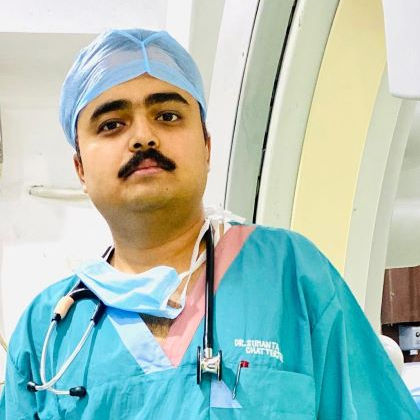
Dr. Sumanta Chatterjee
Cardiologist
12 Years • MBBS,MD General Medicine,DM Cardiology
Kolkata
HealthYou Speciality Clinic & Diagnostics., Kolkata
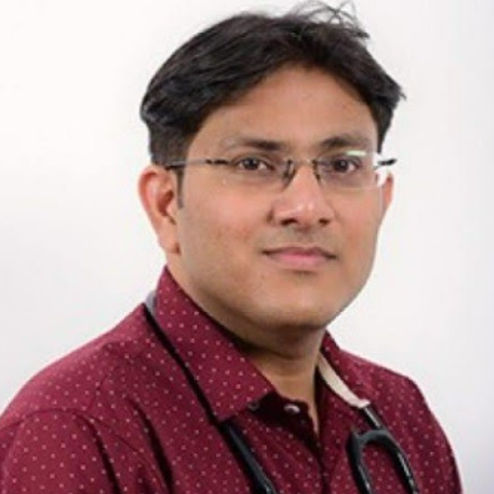
Dr. M Sudhakar Rao
Cardiologist
8 Years • MBBS, MD General Medicine, DM Cardiology
Bengaluru
UMC, Kormangla, Bengaluru
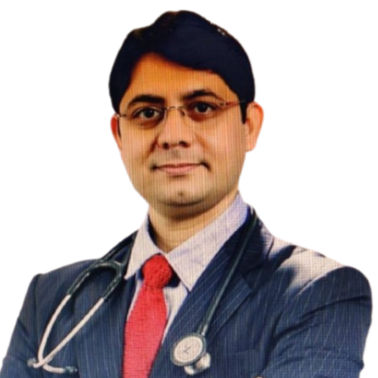
Dr Yogendra Singh Rajput
Cardiologist
16 Years • MBBS, MD (General Madicine), DM (Cardiology)
Gurugram
Svasthya Child & Cardiac Care, Gurugram
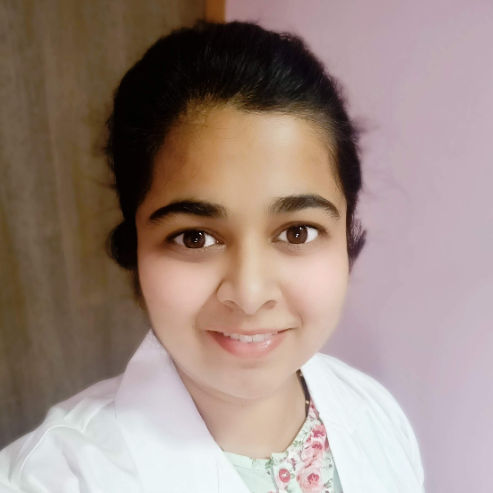
Dr Nazneen Khan
Cardiologist
7 Years • M.B.B.S, M.D (MEDICINE), DrNB CARDIOLOGY
Pune
Apollo Clinic, Viman Nagar, Pune

Dr. E Prabhakar Sastry
General Physician/ Internal Medicine Specialist
40 Years • MD(Internal Medicine)
Manikonda Jagir
Apollo Clinic, Manikonda, Manikonda Jagir
50+ recommendations
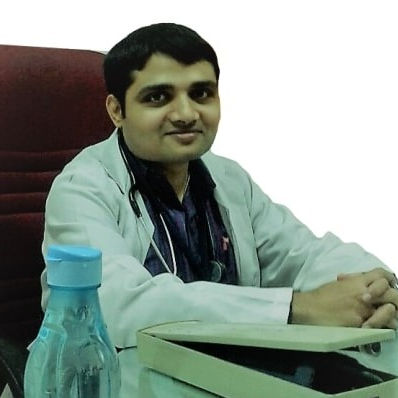
Dr. Arun B S
Cardiologist
10 Years • MBBS, MD, DM
Bengaluru
Apollo Clinic, Electronic City, Bengaluru
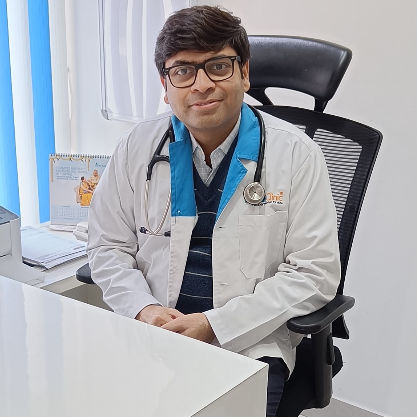
Dr Vikash Goyal
Cardiologist
14 Years • MBBS,MD, DM(Cardiology)
Gurugram
APOLLO SUGAR CLINICS GURUGRAM, Gurugram

Dr. Vikas Kumar
Cardiologist
5 Years • MBBS, Dip. in Cardio
Hyderabad
Apollo Clinic, Nizmapet, Hyderabad
Book Consult for Cardiology Online
Booking an appointment with a top cardiologist is now easier than ever with Apollo 24|7. Their user-friendly platform allows you to schedule an online cardiologist consultation or a physical visit at a trusted hospital or clinic near you. With a wide network of experienced heart specialists, they ensure you have access to the best cardiac care at your convenience. Their cardiologists are highly skilled in diagnosing and treating various heart conditions, and they provide personalised care to help you maintain optimal cardiovascular health. Book your appointment with a cardiologist today and take the first step towards a healthier heart.
What is Cardiology?
Cardiology is a branch of internal medicine that focuses on diagnosing, treating, and preventing disorders related to the heart and the cardiovascular system. This speciality encompasses a wide range of conditions, including coronary artery disease, heart failure, valvular heart disease, and arrhythmias. Cardiologists are trained to manage acute and chronic cardiac conditions as well as to provide preventive care to reduce the risk of developing heart disease. Cardiology plays a crucial role in healthcare, as cardiovascular diseases are a leading cause of morbidity and mortality worldwide. Cardiologists help improve the quality of life and prolong the lifespan of patients with heart conditions by providing specialised care and advanced treatments.
Who is a Cardiologist?
A cardiologist is a physician who specialises in the diagnosis and treatment of conditions affecting the cardiovascular system, which includes the heart, veins, arteries, and capillaries. In the Indian subcontinent, to become a cardiologist, one typically completes an MBBS degree followed by a postgraduate degree in General Medicine (MD or DNB) and then a super-specialisation in Cardiology through a DM or DNB in Cardiology. Cardiologists are trained to diagnose and treat a variety of heart conditions using advanced imaging and diagnostic techniques, medications, invasive procedures, and lifestyle modifications. They play a crucial role in preventive healthcare by helping patients manage risk factors for heart disease, such as hypertension, high cholesterol, and diabetes.
What Do Cardiologists Do?
As heart specialists, cardiologists play a vital role in diagnosing, treating, and preventing cardiovascular diseases. They are the go-to doctors for patients seeking expert care for their cardiac health. Whether you need an online cardiologist consultation or an in-person visit, these heart doctors are equipped to handle a wide range of heart-related conditions. When you book an appointment with a cardiologist, you can expect a thorough evaluation of your cardiovascular health, including a review of your medical history, physical examination, and diagnostic tests. Some of the key responsibilities of cardiologists include:
Diagnosing and treating coronary artery disease, heart failure, valvular heart disease, and arrhythmias.
Performing invasive procedures such as angioplasty, stenting, and pacemaker implantation.
Managing risk factors for heart disease, such as hypertension, high cholesterol, and diabetes.
Providing preventive care and lifestyle modifications to reduce the risk of developing heart disease.
Collaborating with other healthcare professionals, such as stroke specialists, to provide comprehensive care for patients with cardiovascular conditions.
What are the Other Sub-Specialities of Cardiology?
Cardiology encompasses several sub-specialities, each focusing on specific aspects of cardiovascular care. These sub-specialities include:
Interventional Cardiology: This sub-speciality focuses on using minimally invasive procedures, such as angioplasty and stenting, to treat blockages in the coronary arteries and other blood vessels.
Electrophysiology: Electrophysiologists specialise in diagnosing and treating heart rhythm disorders (arrhythmias) using advanced mapping techniques and procedures like ablation and pacemaker implantation.
Paediatric Cardiology: This sub-speciality deals with the diagnosis and treatment of congenital and acquired heart diseases in children, from newborns to adolescents.
Preventive Cardiology: Preventive cardiologists focus on identifying and managing risk factors for heart disease, such as hypertension, high cholesterol, and diabetes, to prevent the development or progression of cardiovascular disorders.
Heart Failure and Transplant Cardiology: This sub-speciality focuses on the management of advanced heart failure and the care of patients who have undergone or are awaiting heart transplantation.
Cardio-Oncology: Cardio-oncologists specialise in the cardiac care of cancer patients, particularly those undergoing chemotherapy or radiation therapy, which can have adverse effects on the heart.
Nuclear Cardiology: This sub-speciality uses radioactive tracers and imaging techniques to assess blood flow and function of the heart, helping diagnose and evaluate the severity of coronary artery disease and other cardiac conditions.
Echocardiography: Echocardiographers use ultrasound technology to create detailed images of the heart, allowing for the assessment of its structure and function.
Cardiovascular Imaging: This sub-speciality utilises advanced imaging modalities, such as cardiac magnetic resonance imaging (MRI) and computed tomography (CT), to visualise the heart and blood vessels, aiding in the diagnosis and management of cardiovascular diseases.
Sports Cardiology: Sports cardiologists focus on the cardiovascular care of athletes, including pre-participation screening, management of heart conditions in athletes, and the promotion of cardiovascular health in sports.
Adult Congenital Heart Disease: This sub-speciality provides ongoing care for adults who were born with heart defects, addressing their unique medical needs and helping them maintain optimal cardiovascular health.
Critical Care Cardiology: Critical care cardiologists manage patients with severe or life-threatening cardiac conditions in the intensive care unit (ICU), providing advanced monitoring and support.
Geriatric Cardiology: This sub-speciality focuses on the cardiovascular care of older adults, taking into account the unique challenges and considerations associated with ageing and co-existing medical conditions.
What are the Examinations Conducted Under Cardiology or Tests Performed by a Cardiologist?
Cardiologists perform a variety of diagnostic tests and examinations to assess the health and function of the heart and blood vessels. These tests help identify potential problems, determine the severity of existing conditions, and guide treatment decisions. Some of the most common examinations conducted under cardiology include:
Electrocardiogram (ECG or EKG): This non-invasive test records the electrical activity of the heart, helping diagnose arrhythmias, heart attacks, and other cardiac conditions.
Echocardiogram: Using ultrasound waves, this test creates detailed images of the heart, allowing cardiologists to assess its structure and function and detect abnormalities such as valve problems or structural defects.
Stress Test: This examination evaluates how well the heart performs under physical stress, typically induced by exercise on a treadmill or stationary bike. It helps diagnose coronary artery disease and determine the severity of existing heart conditions.
Holter Monitor: A portable device that continuously records the heart's electrical activity for 24 to 48 hours, helping detect intermittent arrhythmias or other cardiac events that may not be captured during a standard ECG.
Cardiac Catheterisation: This minimally invasive procedure involves inserting a thin, flexible tube (catheter) into a blood vessel and guiding it to the heart. It allows cardiologists to visualise the coronary arteries, measure blood pressure within the heart, and assess the heart's pumping function.
Coronary Angiography: Often performed during cardiac catheterisation, this test uses X-ray imaging and contrast dye to visualise the coronary arteries, helping identify blockages or narrowing that may indicate coronary artery disease.
Cardiac Magnetic Resonance Imaging: This advanced imaging technique uses powerful magnets and radio waves to create detailed images of the heart, providing valuable information about its structure, function, and blood flow.
Cardiac Computed Tomography: Using X-rays and computer technology, this test creates cross-sectional images of the heart and coronary arteries, helping detect calcium deposits, plaque buildup, and other abnormalities.
What are the Common Conditions and Diseases that Cardiologists Treat?
Here are some of the most common conditions and diseases managed by heart specialists:
Coronary Heart Disease (CHD): Narrowing or blockage of the coronary arteries due to plaque buildup, leading to angina, heart attack, and heart failure.
Atrial Fibrillation: An irregular heart rhythm where the upper chambers of the heart beat chaotically, affecting blood flow to the lower chambers.
Congenital Heart Disease: Malformations in the heart structure present at birth, which may require corrective measures.
Hypertension (High Blood Pressure): Elevated blood pressure that can lead to various cardiovascular complications.
High Cholesterol: Elevated levels of cholesterol in the blood, increasing the risk of heart disease.
Heart Failure: A chronic condition where the heart cannot pump enough blood to meet the body's needs, often leading to fluid buildup in the lungs, abdomen, liver, and lower body.
Pericarditis: Inflammation of the pericardium, the sac surrounding the heart, which can cause sharp chest pain.
Arrhythmias: Abnormal heart rhythms, including conditions like ventricular fibrillation, atrial flutter, and supraventricular tachycardia.
Valvular Heart Disease: Problems with the heart valves, such as stenosis or regurgitation, which can affect blood flow.
Peripheral Artery Disease (PAD): Narrowing or blockage of the peripheral arteries, which can cause leg pain during walking.
Cardiomyopathy: A group of diseases affecting the heart muscle, making it harder for the heart to pump blood effectively.
Aortic Aneurysm: A bulge or weakening in the wall of the aorta, the main artery carrying blood from the heart to the body.
Myocarditis: Inflammation of the heart muscle, often caused by viral infections, which can lead to heart failure.
Endocarditis: An infection of the inner lining of the heart chambers and valves, usually caused by bacteria.
Stroke: A serious condition caused by a disruption of blood supply to the brain, often due to a blocked artery or a ruptured blood vessel. Cardiologists work closely with stroke specialists to manage and prevent strokes related to cardiovascular issues.
Reasons to See a Cardiologist
Consulting a heart doctor is crucial for maintaining optimal cardiovascular health and preventing serious complications. Here are some key reasons why you should consider booking an appointment with a cardiologist near you:
Chest Pain or Discomfort: If you experience chest pain, pressure, or tightness, it could be a sign of underlying heart problems, such as coronary artery disease or a heart attack.
Family History of Heart Disease: If you have a family history of heart disease, you may be at a higher risk of developing cardiovascular issues. A cardiologist can help assess your risk and provide preventive care.
High Cholesterol: Elevated cholesterol levels can increase your risk of heart disease. A heart specialist can help manage your cholesterol levels through lifestyle changes and medication, if necessary.
High Blood Pressure: Hypertension is a major risk factor for various cardiovascular diseases. A cardiologist can help monitor and control your blood pressure to reduce your risk of complications.
Shortness of Breath: Difficulty breathing, especially during physical activity, may indicate heart failure or other cardiac issues. A cardiologist can diagnose and treat the underlying cause.
Abnormal Heart Rhythms: Symptoms like palpitations, irregular heartbeat, or fainting can indicate arrhythmias that require a cardiologist's expertise for proper diagnosis and treatment.
Early diagnosis and preventive care can help reduce the risk of complications and mortality from cardiovascular diseases, implement lifestyle changes and treatments to slow or reverse disease progression, and identify and manage risk factors before they lead to serious health issues.
What Types of Procedures Do Cardiologists Perform?
Cardiologists perform a variety of therapeutic, diagnostic, and surgical procedures, including:
Top Therapies in Cardiology
The following is a list of therapies conducted in cardiology:
EKG: A non-invasive test that records the electrical activity of the heart to diagnose various cardiac conditions.
Echocardiogram: An ultrasound examination that uses sound waves to create images of the heart, allowing cardiologists to evaluate its structure and function.
Coronary Angiography: A diagnostic procedure that uses X-rays and a special dye to visualise the coronary arteries and detect blockages.
Stress Test: A test that measures the heart's response to physical exertion or medication-induced stress, helping diagnose coronary artery disease and assess the effectiveness of treatment.
Cardiac Catheterisation: A minimally invasive procedure that involves inserting a thin, flexible tube (catheter) into the blood vessels to diagnose and treat various heart conditions.
Angioplasty and Stenting: A procedure that involves widening narrowed or blocked coronary arteries using a balloon catheter and placing a stent to keep the artery open.
Cardioversion: A procedure that uses electrical shocks or medication to restore a normal heart rhythm in patients with atrial fibrillation or other arrhythmias.
Pericardiocentesis: A procedure that involves removing excess fluid from the pericardial sac surrounding the heart to relieve pressure and improve heart function.
Tilt Table Test: A diagnostic test that evaluates how the body responds to changes in position, helping diagnose conditions such as syncope (fainting) and postural orthostatic tachycardia syndrome (POTS).
Top Surgeries in Cardiology
The top surgeries performed by cardiologists in India include:
Heart Transplantation: A complex surgical procedure to replace a severely diseased heart with a healthy donor heart for patients with end-stage heart failure or other critical conditions.
Coronary Artery Bypass Grafting (CABG): Open-heart surgery that creates new routes around blocked arteries using blood vessels from other parts of the body, to restore blood flow to the heart.
Pacemaker Implantation: A procedure that involves implanting a small device to help regulate abnormal heart rhythms by sending electrical impulses to the heart.
Implantable Cardioverter Defibrillator (ICD) Placement: A procedure that involves implanting a device that can detect and correct life-threatening arrhythmias by delivering an electric shock to the heart.
Valve Repair or Replacement: Surgical procedures to fix or replace damaged heart valves, either through open-heart surgery or minimally invasive techniques.
Cardiac Resynchronisation Therapy (CRT): A treatment for heart failure that involves implanting a specialised pacemaker to coordinate the contractions of the heart's chambers.
Myocardial Biopsy: A procedure that involves removing a small sample of heart muscle tissue for laboratory analysis to diagnose certain heart conditions.
Septal Myectomy: Open-heart surgery to remove part of the thickened heart muscle wall (septum) in patients with hypertrophic cardiomyopathy, to improve blood flow and reduce symptoms.
Cardiac Ablation: A procedure that uses heat or cold energy to create tiny scars in the heart tissue to block abnormal electrical signals causing arrhythmias.
Why Choose an Apollo 24|7 Cardiologist?
Apollo 24|7 cardiologists are highly skilled and experienced in diagnosing and treating a wide range of cardiovascular conditions. Their team of heart specialists includes some of the best cardiologists in the country, with extensive expertise in the latest diagnostic techniques and treatment options. When you book a cardiologist through Apollo 24|7, you can access personalised care tailored to your unique needs, whether through online cardiologist consultations or in-clinic appointments.
Apollo 24|7's cardiologists are committed to providing compassionate, patient-centred care, taking the time to understand your concerns and develop comprehensive treatment plans. With Apollo 24|7, you can easily access cardiologist reviews and ratings to help you choose the right specialist for your needs. They also offer transparent information on cardiologist fees, ensuring that you can make informed decisions about your healthcare.
What to Expect When Visiting a Cardiologist?
During your first visit to a cardiologist, you can expect a thorough evaluation of your heart health. This may include:
Medical History Review: Your cardiologist will ask about your symptoms, family history of heart disease, and any pre-existing conditions or risk factors.
Physical Examination: They will check your blood pressure and pulse, and listen to your heart and lungs for any abnormal sounds or rhythms.
Diagnostic Tests: Depending on your symptoms and risk factors, your cardiologist may order tests such as an ECG, echocardiogram, stress test, or blood work to assess your heart function and look for signs of disease.
Discussion of Results: Your cardiologist will explain the findings of your evaluation and discuss any areas of concern or potential diagnoses.
Treatment Planning: If a heart condition is identified, your cardiologist will work with you to develop a personalised treatment plan, which may include medications, lifestyle changes, or procedures.
Preventive Care Recommendations: Even if no significant problems are found, your cardiologist may offer guidance on maintaining a healthy heart, such as diet, exercise, and stress management tips.
How Can I Get an Appointment With a Cardiologist?
Booking an appointment with a cardiologist through Apollo 24|7 is a simple and convenient process. Here's how you can schedule a consultation:
Online Booking: Visit the Apollo 24|7 website and navigate to the "Book Appointment" section. Select "Cardiology" as the speciality and choose a cardiologist based on their profile, experience, and cardiologist reviews. Select a suitable date and time for your appointment and complete the booking process.
Mobile App: Download the Apollo 24|7 mobile app from the App Store or Google Play Store. Log in or create an account, then select "Cardiology" from the list of specialities. Choose your preferred cardiologist, date, and time for the appointment, and confirm your booking.
Offline Booking: If you prefer to book an appointment offline, you can call the Apollo 24|7 helpline number. Their customer support team will assist you in finding a suitable cardiologist near you and scheduling an appointment at your convenience.
In some cases, you may need a referral from your primary care physician or another specialist to consult a cardiologist. If you have a referral, please provide the relevant details when booking your appointment to ensure a smooth consultation process.
Cardiologists in top cities
- •Best Cardiologists in Bengaluru
- •Best Cardiologists in Chennai
- •Best Cardiologists in Hyderabad
- •Best Cardiologists in Kolkata
- •Best Cardiologists in New Delhi
- •Best Cardiologists in Mumbai
- •Best Cardiologists in Ahmedabad
- •Best Cardiologists in Pune
- •Best Cardiologists in Gurugram
- •Best Cardiologists in Guwahati
- •Best Cardiologists in Mysuru
- •Best Cardiologists in Chinagadila
- •Best Cardiologists in Hyderguda
- •Best Cardiologists in Indore
- •Best Cardiologists in Lucknow
- •Best Cardiologists in Madurai
- •Best Cardiologists in Bhubaneswar
- •Best Cardiologists in Noida
- •Best Cardiologists in Tiruchirappalli
- •Best Cardiologists in Visakhapatnam
Related Treatments
- •Treatment for Acute Pericarditis
- •Treatment for Ambulatory Blood Pressure Monitoring
- •Treatment for Andersen Tawil Syndrome
- •Treatment for Acute Aortic Dissection
- •Treatment for Adenomyosis
- •Treatment for Amyotrophic lateral sclerosis
- •Treatment for Acute Diarrhea Treatment
- •Treatment for Ankle Pain
- •Treatment for Abnormal Heartbeat
- •Treatment for Acute Myocardial Infarction
- •Treatment for Abdominal aortic aneurysm
- •Treatment for Acute coronary syndrome
- •Treatment for Angina
- •Treatment for Angiopathy
- •Treatment for Stress Management Specialist
- •Treatment for Adopted Child Syndrome Treatment
- •Treatment for Aicardi Goutieres Syndrome Disorder
- •Treatment for Aicardi Syndrome
- •Treatment for Aneurysm
- •Treatment for Aneurysms
Related Procedures
FAQs
What is a heart specialist called?
A heart specialist is called a cardiologist. Cardiologists are doctors who specialise in diagnosing and treating diseases of the heart and blood vessels. They undergo extensive medical training, including a three-year residency in internal medicine followed by a three-year fellowship in cardiology, to become experts in managing heart health.
What does a cardiologist do?
A cardiologist is a medical doctor who specialises in diagnosing and treating diseases of the heart and blood vessels. They perform physical examinations, order and interpret diagnostic tests, prescribe medications, and perform procedures to manage heart conditions. Cardiologists also provide guidance on lifestyle changes to promote heart health.
How do I find a cardiologist near me?
To find a cardiologist near you, start by asking your family physician for a referral. You can also search online directories, such as those provided by medical associations or healthcare providers. Consider factors like the cardiologist's location, expertise, and patient reviews when making your choice.
Can I book a cardiologist appointment online?
Yes, many healthcare providers now offer the option to book an appointment with a cardiologist online. You can typically do this through the provider's website or a dedicated healthcare app. Online booking allows you to conveniently schedule your appointment and may even offer the option for an online cardiologist consultation.
What is the average cardiologist fee?
The fee for a cardiologist consultation can vary depending on factors such as location, expertise, and the complexity of your condition. Some cardiologists may offer discounted fees for follow-up visits
How can I get an online cardiologist consultation?
Many healthcare providers now offer online consultations with cardiologists. To get an online cardiologist consultation, check with your local healthcare provider or search for reputable telemedicine platforms. You will typically need to provide your medical history and any relevant test results before the consultation.
What should I expect during my first cardiologist appointment?
During your first appointment, the cardiologist will review your medical history, ask about your symptoms, and perform a physical examination. They may order diagnostic tests, such as an ECG or stress test, to assess your heart health. The cardiologist will then discuss your diagnosis and treatment options with you.
Can a cardiologist treat a stroke?
While cardiologists primarily focus on heart health, they can play a role in treating certain types of strokes. Some strokes, called embolic strokes, are caused by blood clots that originate in the heart. In these cases, a cardiologist may work with a stroke specialist to manage the patient's care.
How do I choose the best cardiologist?
To choose the best cardiologist, consider factors such as their education, training, and experience in treating your specific condition. Look for a cardiologist who is board-certified and has a good reputation among patients and other healthcare providers. Reading patient reviews and asking for recommendations from your family doctor can also help.
What are the most common heart conditions treated by cardiologists?
Cardiologists treat a wide range of heart conditions, including coronary artery disease, heart valve disorders, heart failure, and arrhythmias. They also manage risk factors for heart disease, such as high blood pressure, high cholesterol, and diabetes. If you experience symptoms like chest pain, shortness of breath, or palpitations, consult a cardiologist.